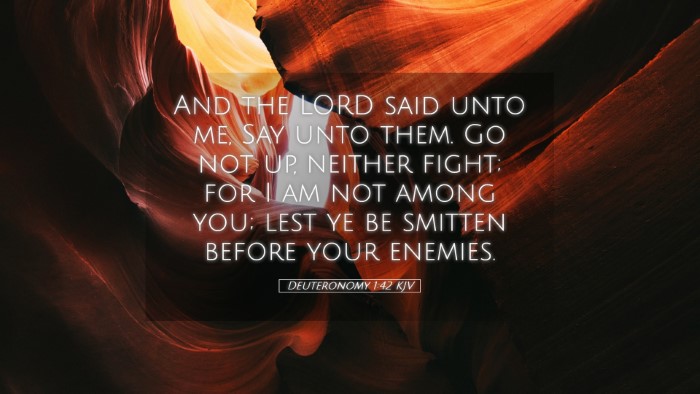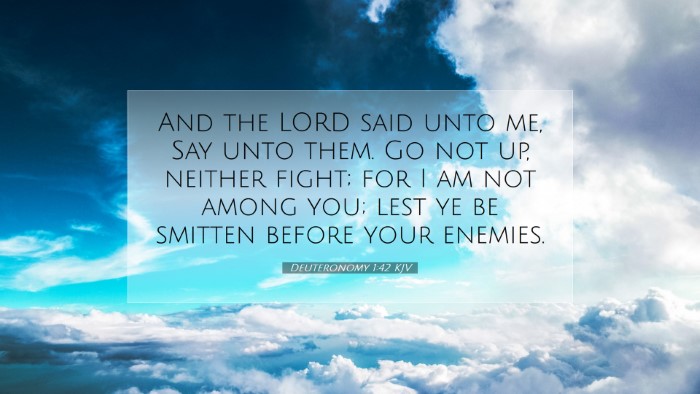Commentary on Deuteronomy 1:42
Bible Verse: "But the Lord said to me, 'Say to them, You shall not go up nor fight, for I am not among you; lest you be defeated before your enemies.'" - Deuteronomy 1:42
Introduction
The passage under consideration presents a critical moment in the history of the Israelites, reflecting God's direction to Moses in permitting the people to act in obedience or disobedience to His word. This commentary synthesizes insights from several public domain sources, providing a comprehensive look at the context, meaning, and applications of this verse for contemporary readers, particularly pastors, students, theologians, and Bible scholars.
Context and Background
Deuteronomy 1 serves as a pivotal chapter that recounts Israel's journey from Egypt to Canaan. After the spies returned with their report, the people mistakenly allowed fear and doubt to govern their actions. Rather than trusting in God's promises, they attempted to overrule God's command and proceed into battle against the inhabitants of Canaan.
Historical Setting
Moses speaks to a new generation, reminding them of the previous failures and the dire consequences of disobedience. The narrative highlights the importance of heeding divine guidance, as the Israelites sought to reclaim their destiny through human effort rather than divine instruction.
Exegesis of Deuteronomy 1:42
This verse serves as a profound reminder of the necessity of divine presence in Israel's endeavors. The refusal of God’s guidance leads to certain defeat:
Divine Authority
Matthew Henry emphasizes that God’s command was clear; to disobey it was to invite disaster. The people’s willful decision to engage in battle without God’s endorsement showcases their distrust and rebellious spirit.
Albert Barnes elaborates that God's instructions were not only a reassurance of His presence but also a critical criterion for success. The phrase “I am not among you” indicates that without divine support, any military endeavor is futile.
The Consequence of Disobedience
Moses warns the Israelites of the severe implications of proceeding without God’s consent. This reflects a broader biblical theme, where disobedience leads to moral and physical defeat:
- Adam Clarke notes that this verse highlights Israel’s failure to recognize their reliance on God. When they chose to fight despite the warning, they set themselves up for inevitable defeat.
- Henry stresses the gravity of overstepping divine boundaries: “Without the presence of God, how can we hope for victory against our greatest foes?”
Application for Contemporary Readers
This verse holds significant implications for modern believers, particularly in understanding the importance of seeking God’s will in all decisions:
Trust and Obedience
The Israelites' situation serves as a cautionary tale. Leaders and individuals must remain attuned to God's directives, lest they venture down paths leading to destruction:
- Pastors must teach congregants about the importance of prayerful discernment and reliance on the Holy Spirit before embarking on new ventures.
- Theologians should explore the tension between divine sovereignty and human agency, examining how faith informs action.
The Fallibility of Human Judgment
This narrative presents a significant lesson about human judgment. Clarke argues that our understanding is often limited, and we must acknowledge our need for divine insight in every sense:
- Barnes encourages readers to reflect on their decision-making processes and consider whether they align with God’s will.
- Henry challenges spiritual leaders to ensure their congregations are engaged in the necessary preparatory prayer and seeking the Lord’s presence before undertaking significant tasks.
Conclusion
Deuteronomy 1:42 encapsulates essential truths about the necessity of God's guidance in every endeavor. The passage challenges readers to evaluate their lives in light of divine instruction, urging believers to seek God's presence actively and obediently follow His commands. Through the synthesis of these profound commentaries, we glean fresh insights that remain applicable as we seek to understand our journey with God.


